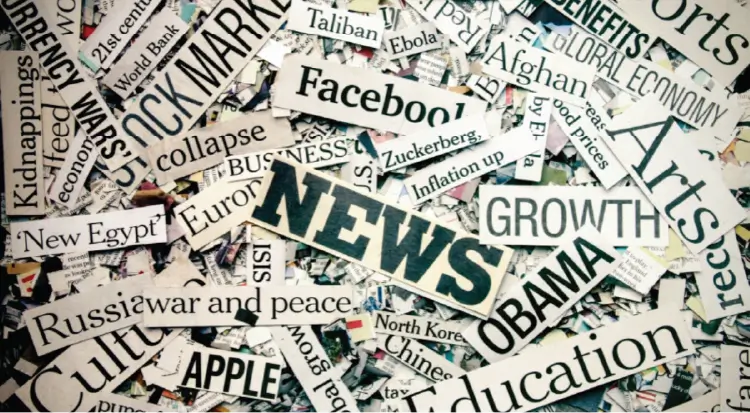Despite being slow to catch on, artificial intelligence has become an essential component of business growth in the media industry. It is increasingly prevalent, with AI-related terms such as Big Data and predictive analytics becoming commonplace in workplaces.
Regarding the future of AI in publishing, numerous opportunities arise that can propel publishers to the forefront. A survey indicates that 75% of publishers believe AI will be vital to their business success in the next three years.
However, as the use of artificial intelligence in media technology garners more attention, it also attracts increased skepticism.
In this paper, we explore the role AI plays in the media landscape, its impact on significant industry challenges, and its envisioned role in the future of publishing.
The Increasing Significance of AI in the Media Industry
A prevalent misconception in the media industry is that AI is replacing human jobs. In reality, the true power of artificial intelligence lies in its ability to disrupt traditional workflows and enhance performance. For instance, it can automate manual tasks, freeing up sales teams to focus on more crucial activities, such as sales itself.
AI will undoubtedly continue to act as a disruptive force, transforming various aspects ranging from lead generation to customer engagement to content creation. Notably, ChatGPT has already made significant waves in this regard. However, this disruption also brings unprecedented opportunities and is expected to drive enhancements throughout the entire value chain:
- AI trend analysis will assist writers in creating relevant content that resonates with their audience, leading to improved engagement rates.
- AI is anticipated to analyze reader data and provide personalized recommendations and experiences, thereby guiding consumers further along the value chain.
- AI will empower publishers with dynamic control over paywalls, enabling them to adapt to the specific needs of individual consumers.
- AI will facilitate churn prediction modeling, empowering publishers to proactively re-engage with readers before they become at risk of churning.
All of these developments underscore the increasing role of AI in generating reader revenue. By offering better data, automation, workflows, and products, artificial intelligence in the media industry will aid publishers in capturing the most precious resource of all: people’s time and attention.
Thriving the Era of ‘ATTENTION ECONOMY’
We are currently operating within an attention economy, where publishers are constantly competing for readers’ attention and engagement. Traditional methods of marketing to consumers, such as through conventional sales funnels, are no longer sufficient for publishers to survive in the evolving media landscape.
With the growing demand for instant gratification and evolving consumer expectations, it is evident that the attention economy will dominate the future of media. Those who embrace AI tools today will be the ones to flourish in this highly competitive environment.
Innovations such as AI assist tools, dynamic product configuration, AI-generated content, and real-time reporting capabilities will all play significant roles in shaping the future of publishing.
Furthermore, leveraging machine learning algorithms and natural language processing (NLP) will be essential in converting vast amounts of data into actionable insights that inform business strategies and enhance competitive advantage.
The Primary Hurdles for Publishers
The most significant obstacle faced by publishers concerning artificial intelligence in the media industry is the misconception that digital transformation is a destination rather than an ongoing process.
Technology and consumer behavior are constantly evolving at a rapid pace. To effectively innovate and capitalize on these changes, publishers must establish a flexible system that enables them to keep up with the dynamic landscape.
By embracing and accelerating the adoption of AI, publishers can effectively respond to disruptions and future-proof their businesses. Those who have already invested in AI tools gain an instant advantage and can swiftly adapt to emerging industry trends.
In fact, 45% of experienced AI adopters affirm that artificial intelligence has provided them with a distinct edge over their competitors.
The Role of Artificial Intelligence in Promotion Management
Promotion management encompasses various activities such as media planning, media scheduling, advertising campaign management, and search engine optimization. In recent times, promotion tactics have undergone a transformation from physical to phygital, with digital marketing and social media campaigns gaining prominence due to global digital transformation.
In today’s technologically advanced world, customers hold the power to decide the content, placement, and timing of promotional efforts. Artificial intelligence (AI) plays a crucial role in this landscape by offering personalized and customized messaging based on customer profiles and preferences (Huang & Rust, 2020). Through content analytics, AI can optimize the value and effectiveness of promotional messages.
Real-time tracking of customer preferences and dislikes is made possible through emotive AI algorithms, providing valuable insights for marketers. Furthermore, leveraging netnography on social media content opens up new avenues for marketers to align their strategies with customer preferences and interests.
What an Artificial Intelligence in Media Addresses Industry Challenges
The future of AI in publishing offers numerous opportunities to propel media companies into a new era of success.
The integration of artificial intelligence into media technology is becoming the new standard, and early adopters are already reaping the rewards. In fact, according to McKinsey’s 2020 Global Survey on artificial intelligence, respondents attribute over 20% of their company’s revenue to AI.
Adpoint serves as an example of how artificial intelligence in media technology is revolutionizing not only how publishers market to customers but also how customers respond to this marketing. Adpoint’s AI functionalities address significant industry challenges, including:
- Integration with the human workforce: Adpoint integrates AI with human workforces, resulting in more efficient processes and the potential for job augmentation rather than replacement.
- Interactivity: Adpoint’s AI tools enhance interactivity and engagement between readers and publishers. They enable more personalized and interactive content experiences.
- Real-time analysis: AI analytics provide media companies with real-time insights from reader data, informing content strategy and editorial decisions.
- Personalization: AI enables more personalized content recommendations, enhancing the overall reading experience for consumers. It continually nurtures them towards higher levels of engagement and monetization.
Conclusion
It’s time to dispel the notion that AI is expensive and complicated futuristic technology. Artificial intelligence has become an indispensable part of the publishing world. Implementing AI tools that perform manual tasks faster, cheaper, and more reliably than humans is now more affordable than ever.
The future of artificial intelligence in media shines brightly due to the multitude of benefits it brings. If you don’t harness the power of this technology now, rest assured your competitors will.









